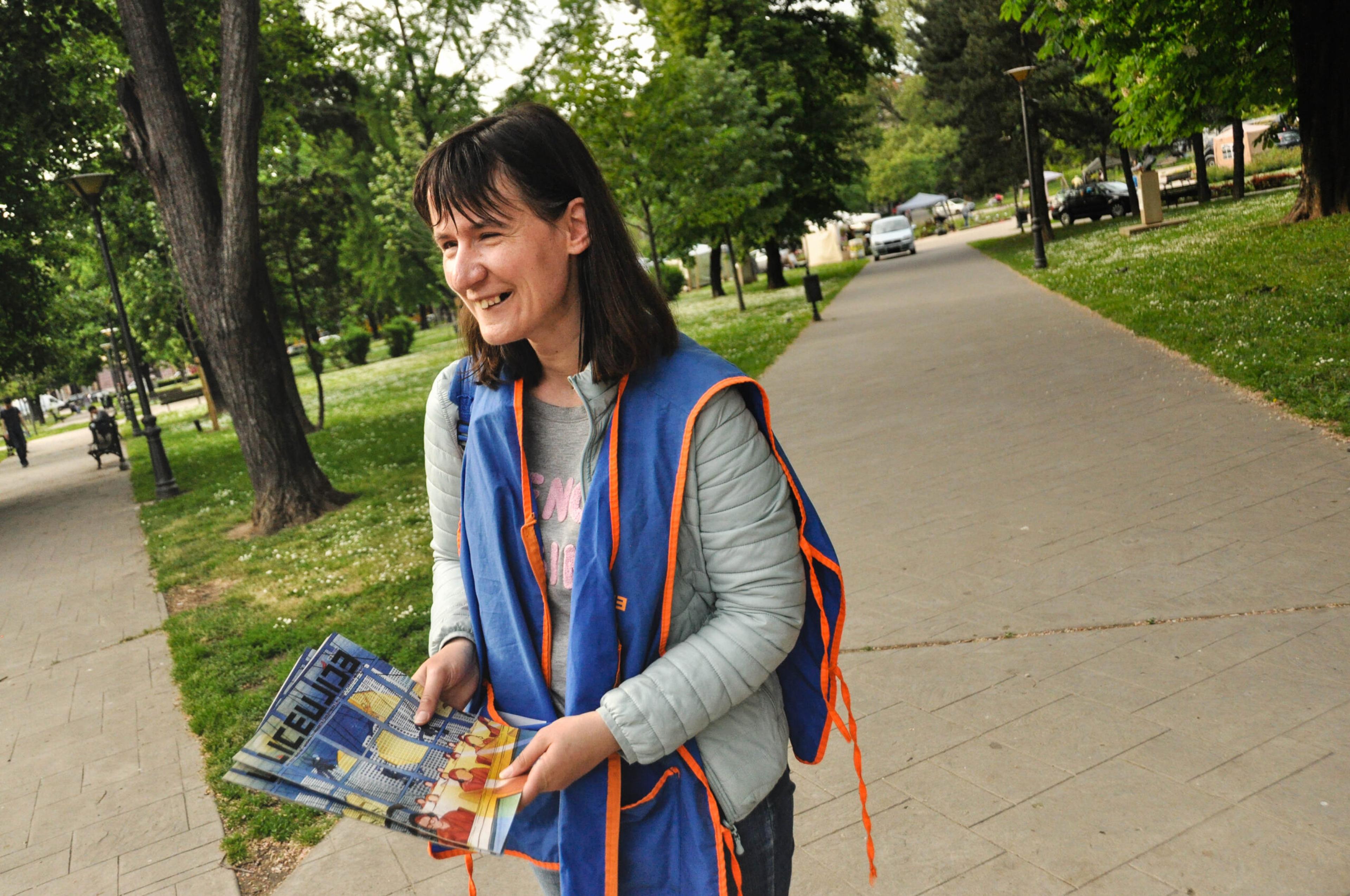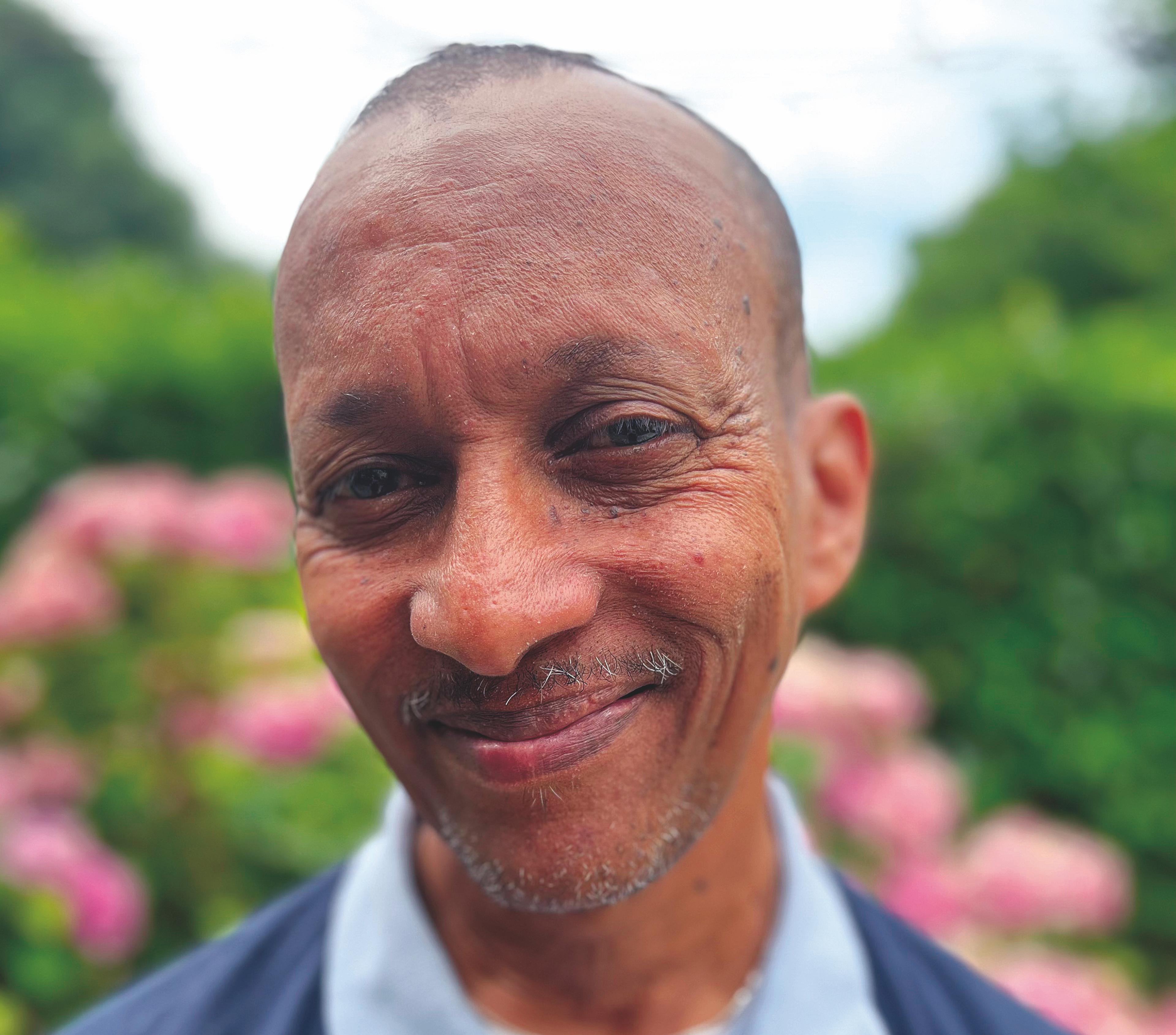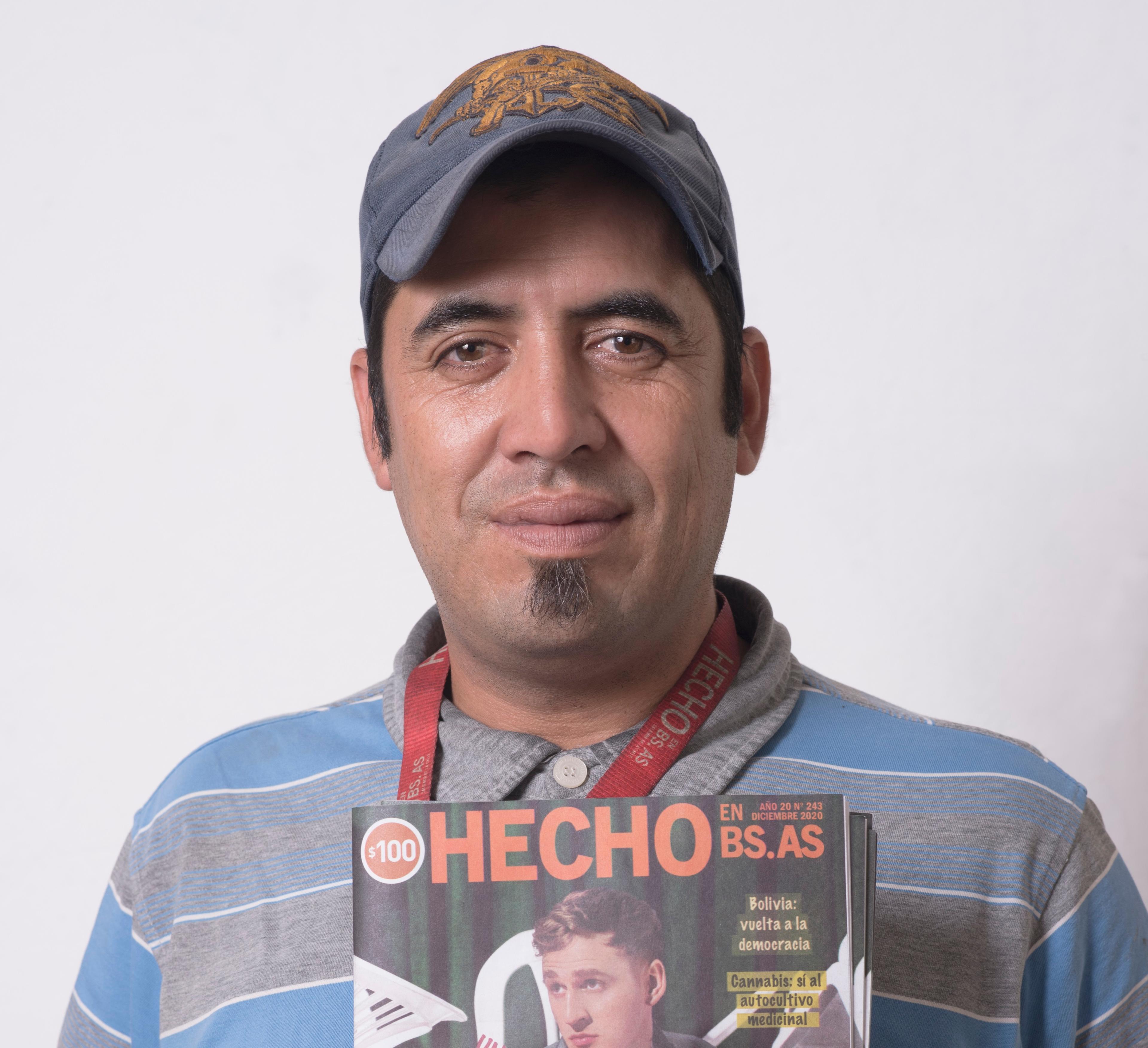Washington DC street paper vendor Nikki Smith on helping others — and herself
By Annemarie Cuccia
- Vendor stories
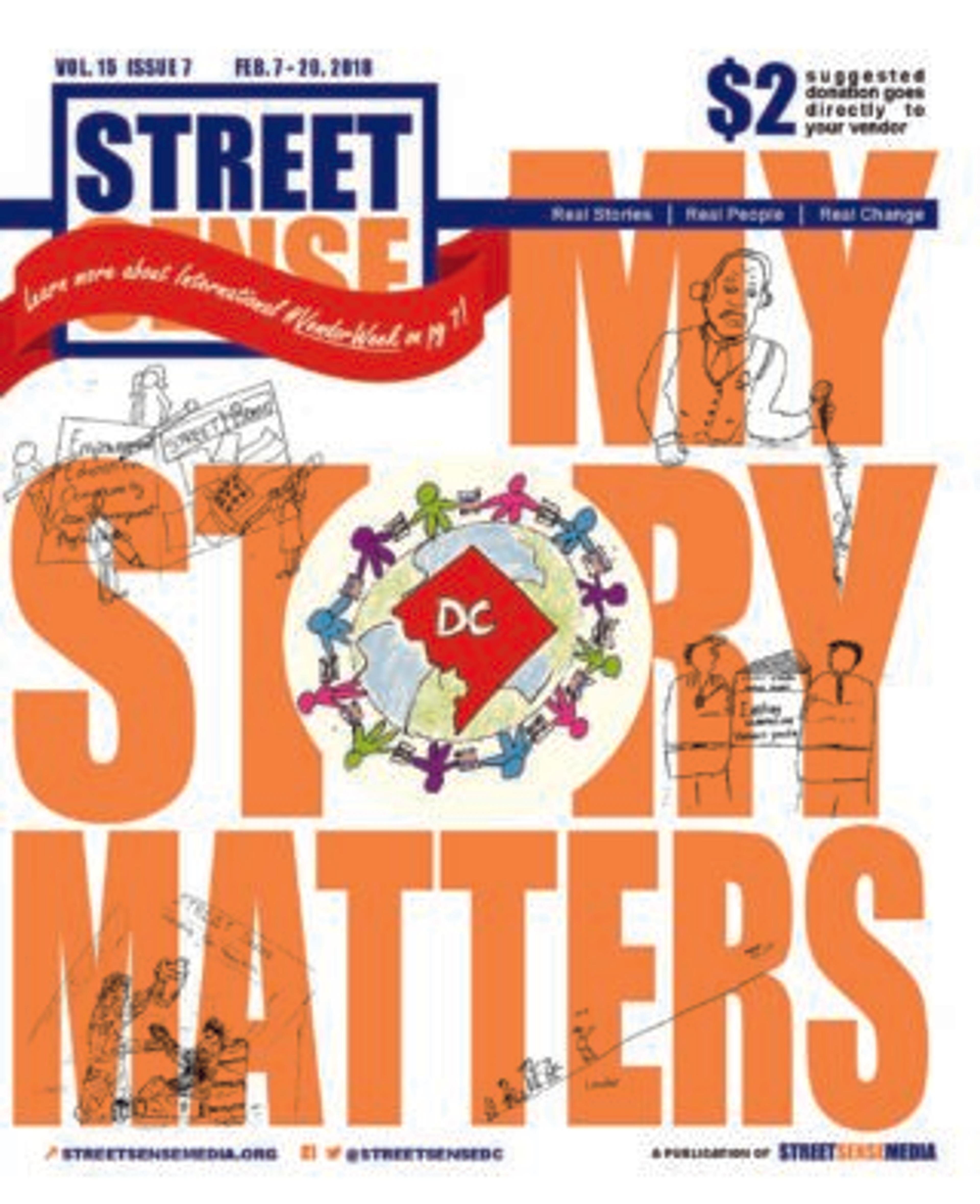
Nikki Smith, who moved to Washington DC earlier this year, is already making an impact with her art and advocacy. She moved from a tent to a shelter and has been working on her writing which is now being published in the local street paper Street Sense. And she’s working with an initiative to help women experiencing homelessness become involved in advocacy like her.
The first thing Nikki Smith noticed when she got off the train from Philadelphia to D.C. was that she didn’t see any stray animals. That made sense, she thought. It isn’t safe for animals to sleep outside.
But then she noticed how many people in D.C. slept outside every night, far more than she’d seen in Philadelphia. She was horrified. The outdoors were not safe for people either.
In the months she’s been in D.C., Smith, 44, has been able to do a lot of things for herself. She moved from a tent into a shelter, she has spent hours writing. And she always keeps her nails and hair looking sharp. But she’s also devoted plenty of time to helping others still sleeping outside, from doing outreach with the nonprofit People for Fairness Coalition, where she co-leads the Rhonda Whitaker Streets to Life Initiative, helping women experiencing homelessness become involved in advocacy, to testifying regularly in front of the D.C. Council.
Street Sense caught up with Smith, who’s also an artist and vendor with Street Sense Media, to hear about her move to D.C., her busy life and how she balances caring for others with caring for herself.
The following interview has been edited for length and clarity.
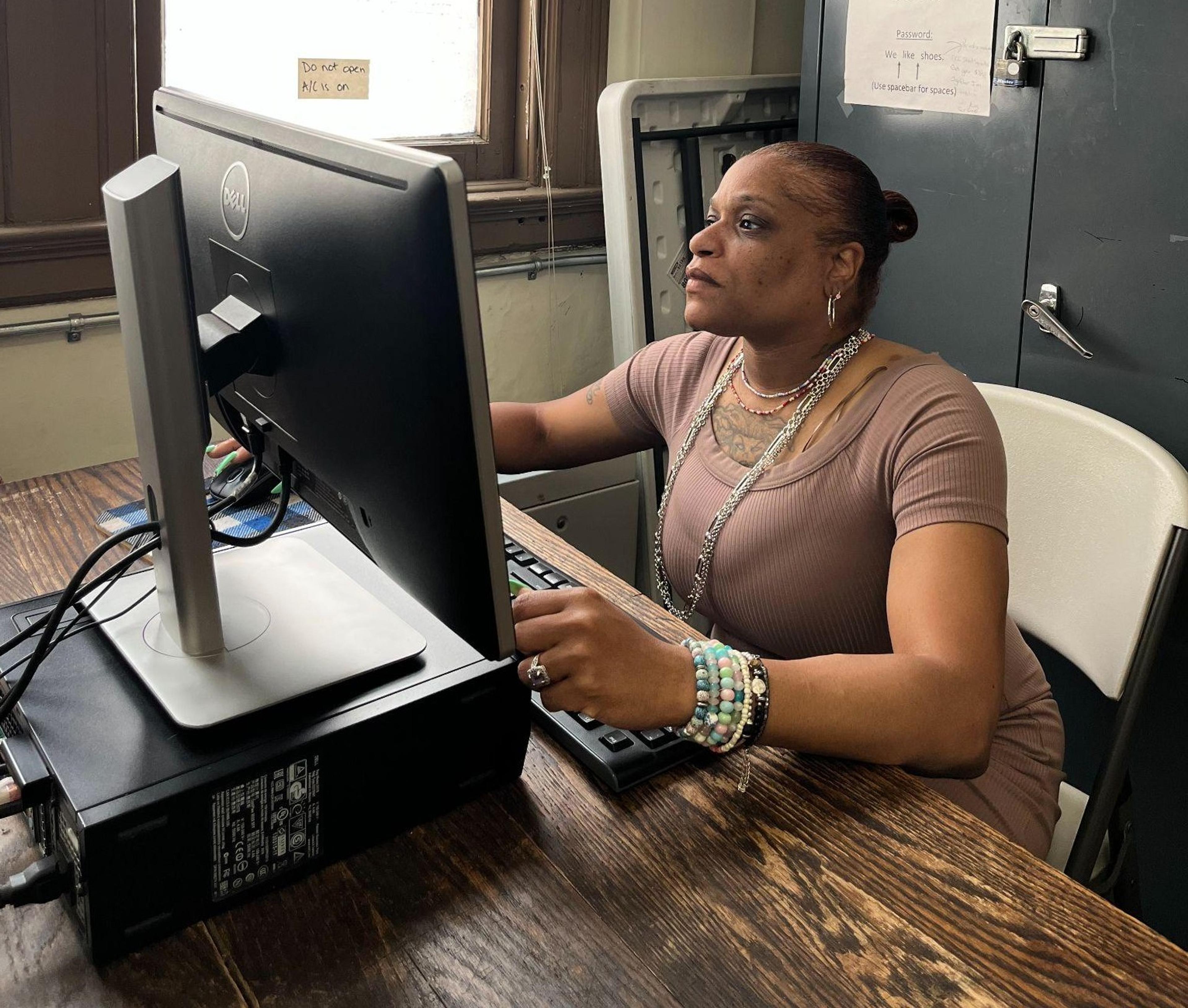
Nikki Smith in the Street Sense Vendor’s Lounge, where she often writes. Photo by Annemarie Cuccia.
Can you introduce yourself to our readers?
My name is Nikila Smith, but I prefer to be called Nikki. I am a married woman who’s homeless. I love to say that, it doesn’t bother me. I’m new to Washington, D.C. I love Street Sense Media. I would work for y’all seven days a week if I could.
Why did you come to D.C.?
There was a lot going on. And I just was not happy with my life, and I had a marriage and I had a family, and it was like I was at a dead end. And I was not gonna make it. So I just picked up and I left, thought I’d start over fresh. I’m here to make God happy, that’s why I’m here.
People I feel like know me here, more than the people who should have known me. Coming over here was just a blessing. I can't believe I'm over here.
You’ve really gotten involved with writing, I think you come in every day with ideas and read at the Street Sense Media’s poetry slam in April. What inspires your writing?
Life. People. I always wanted to write and ask questions, but it was hard to do because people don't have answers or they don't want to hear you. So I never would have imagined I would be writing articles. Some days I’m just ecstatic, like I have written so many poems, and I've been going back and looking at them like “Did I write this”? It is so awesome to be around others who inspire me. I really, really love it. I wouldn't have it any other way
What role does writing play in your life?
I think I would be stressed right now without it, because sometimes you have a lot of stuff that you want to say and you just can't get it out. So my way of releasing it is through writing. I actually like to do premeditated writing, because I write something in advance and then it'll come back up and I'm like “Oh I already got that.” It feels good to do that.
What inspired you to get started with outreach?
I was already doing outreach out of my tent — I’m in a shelter right now but before I was living in a tent. But I work for People for Fairness Coalition (PFFC) now, I am a co-director. What inspired me to join PFFC was, they had a vigil for the homeless people who die every year, and I was interested, but I thought they could do better. But how are you going to tell someone to do something better? If you have some thoughts you should join, not just throw stones at them.
I’m irritated, some days I'm scared. 'Am I going to die out on the streets with no roof over my head?' That’s a scary feeling, cause there’s a lot of people that’s older than me that’s still out there. All I can do is what I can do. So I try to make people comfortable, talk to them like a good friend.
What's it like doing outreach while still homeless yourself?
I never really think about myself. I've been homeless all my life really, on and off. It’s been happening, that’s how our system is designed. But you can only do what you can do, so I'm doing what I can do right now, and it's to help others. I don't feel sorry for myself.
It was hard when I first came here because I knew about mental illness, but not to this extent. I still can’t figure out why people are out here like this with no help. No, I can't get used to that. But I care to learn, so I communicate. It means a lot to know what triggers people, and what makes them happy. I try to do my best, but I'm only human too. So I have to let them know I'm going through stuff too, I might not look like it, but we're all in the same boat.
I think I'm fighting with myself, do I want to adapt or do I want to let everyone know that's not how it's supposed to be? These people are not supposed to be out here, they're supposed to be getting help. How could you see somebody with dementia or Alzheimer's disease sitting outside? That's not right.
When I'm coming into Street Sense, I have my music on and I’ll be jamming and I'm like “Yeah I'm in a good mood” but then I’ll turn around and see somebody laying on the ground. And you help one person out with something to eat, then it's more and more and more. You can't help everybody because then you'll be broke, so some days I got to say no. And it hurts.
I’m irritated, some days I'm scared. “Am I going to die out on the streets with no roof over my head?” That’s a scary feeling, cause there’s a lot of them that’s older than me that’s still out there. Let’s be honest, they’re going to pass away on the streets. That's, whew, that’ll mess your whole day up too. All I can do is what I can do. So I try to make people comfortable, talk to them like a good friend. I would like to be a case manager, so I'm always going to listen to what’s going on. As long as God puts breath in my body, I'm always going to help others.
What more do you feel D.C. can do to end homelessness?
It can be ended, it can. Even in Philly, when I was walking around, I saw buildings they were not using. You can turn it into a shelter or apartment real fast. I used to model buildings and do home improvement and stuff so I know how fast you can turn a room into an apartment, it’s nothing, it takes no time.
What would you want to do as a case manager?
I like the setup they got at the Downtown Day Services Center, but the problem is they close. Weekdays it’s from 9 to 5, and on Saturday it's from 10 to 3, so they don’t got nowhere to go after that. I want to have something for night time. And that’ll bring most of the people off the streets too, I think that’s doable. I’m going to hear when they say that lived experience is acceptable to become a case manager, and then I’m gonna go. I believe in five years it’s going to be done. These are my plans.
What do you like about D.C.?
Don’t laugh at me. But the people here are so bougie. Like when I first came here, nobody wanted to speak to me or anything, but I came to understand, I'm kinda boogie too. I like the high maintenance thing,.I'm into the high quality, but I'm not into treating people like trash. I'm not into that.
In the little bit of time that I've been in D.C. I’m making a difference because I'm all over the place. I didn't even talk about half the stuff that I do, because I'm not supposed to, that’s behind the scenes.
Support our News Service
We believe journalism can change lives, perceptions, and society - underpinning democracy for a more equitable world. Learn more about the INSP News Service and how to support it here.
